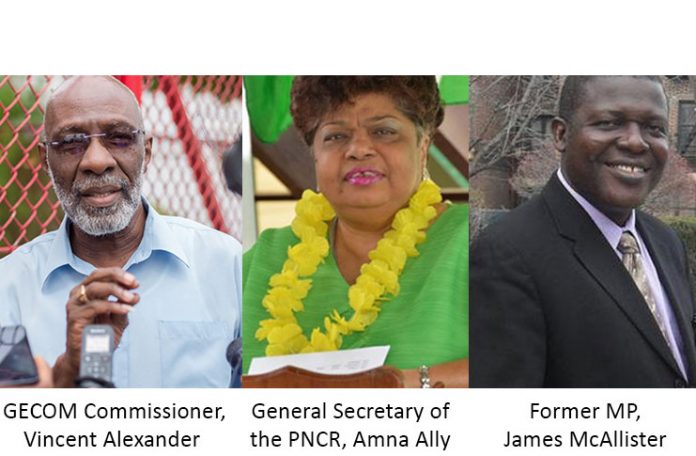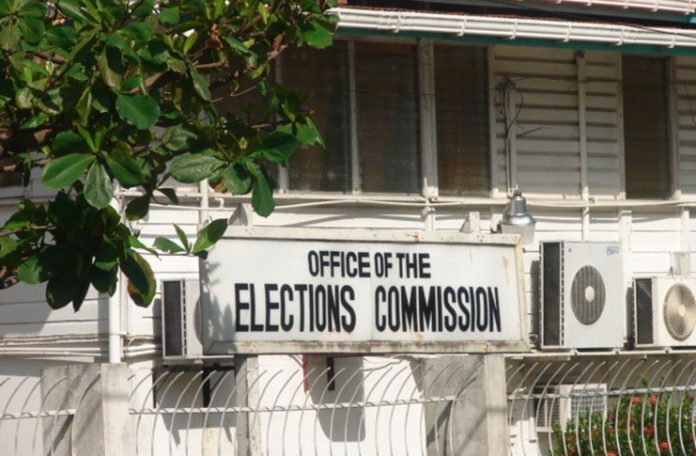Over 120,000 dead persons names on Voters’ List
THERE is high possibility that the current voters’ list is bloated with as many as 120,000 dead or non-existent persons, making it vulnerable to fraud, corruption and overall sinister agendas.
This is according to former People’s National Congress/Reform (PNC/R) Executive, James McAllister, who recently examined the figures of Guyana’s most recent census; voters’ list and voters’ turnout.
In a Facebook post on Saturday, he broke down these figures explaining that there must be some ulterior motive afoot that would cause any political party to be against the holding of fresh house-to-house registration.
“There must be some sinister agenda by those clamoring for elections without house-to-house registration,” he began. “The 2012 Census recorded a population of 746,955. Of this, 39 per cent was less than 18. Using census figures from 1980, 1991, 2001, and 2012, I forecasted that the population in 2015 was approximately 745,600. Assuming that 39 per cent is below 18, then approximately 454,816 were over 18 and eligible to vote in 2015. Yet we had a votes list with 583,444 names. That is a whopping 128,600 plus dead or nonexistent persons.”
McAllister noted that this represents and overstating of the voting population on the recently used list by over 28 per cent. He added: “And this is assuming a 100 per cent registration of all eligible electors. If 90 per cent registration is assumed then the list was bloated by over 42 per cent. A list as flawed as this provided great opportunity for fraud and corruption.”
Presenting additional information to support the position, McAllister highlighted that the Guyana Elections Commission (GECOM) had declared a 71.26 per cent voter turnout for the 2015 elections.
However, he noted that looking at the current census figures and assuming a 90 per cent registration rate, the actually voter turnout was 102 per cent which represents more voters than people.
He added that even if one were to assume a 100 per cent registration rate which his highly improbable, the voter turnout in 2015 would then be 91 per cent, still a highly improbable turnout.
Another example he gave was that a large number of polling places where the Peoples Progressive Party/Civic (PPP/C) received the majority votes, the turnout is computed at more than 120 per cent.
“Even if we assume a 100 per cent, this scenario points to a high incidence of substitute voting. This is when someone impersonates an elector and votes in his or her place. It’s quite possible that the present voters list is bloated by as much as 35 per cent. Anyone suggesting going to elections with such a list has a sinister agenda. The PPP claim that such a list could be cleansed is just a plain joke. There must be house-to-house registration before elections in 2020,” McAllister concluded.
In the 2019 budget, the government had allocated $3B towards fresh house-to-house registration to be conducted by GECOM. However, prior to the allocation and even now, Opposition Leader Bharrat Jagdeo has opposed new registrations, contending that the Guyana Register Office (GRO) can provide this function.
These are not the sentiments of GECOM Chair, retired Justice James Patterson, who back in March 2018 asserted that the only way to ensure that cries of malpractices by parties become a thing of the past, is to nip it in the bud. “Looking at the past, see what has gone wrong in the past and remedy it and to see what we can anticipate in the future and block that,” he told the Department of Public Information (DPI).
“The human brain can always fabricate some scheme to hit at the proper running of the voting process. We have to anticipate that and block it.”
However, McAllister is not the first or only individual to have found inconsistencies with the voters list, as the same was highlighted by GECOM Commissioner, Vincent Alexander, and other Ministers of Government.
“I am an advocate for house-to-house registration. I am not only an advocate, but one who is aware of the institutional decision taken years ago that we should have registration every seven years; and that we haven’t means that we do not have what is considered to be the ‘best list’,” Alexander told media operatives earlier in the year.
GECOM is currently deliberating the best possible timeline for the hosting of new elections which meets all the criteria for a free and fair democratic process. He added: “We have a population of 740,000 I’m told. [Meanwhile] we have a list in the vicinity of 500,000, which is clear that the list is in excess of the resident voters. In my view, that allows for the elections to be corrupted in the sense that political people can use the excess to manipulate voting and have a result that is not reflective of the resident Guyanese; and so we need to deal with that.”
Government Chief Whip, Amna Ally, told the Guyana Chronicle recently that she believes that the current voters’ list is “compromised” and one which has already been used by the opposition to solicit illegal votes.
Her contention is also that many persons who have now attained the eligible age to vote would be disqualified if the old list is used.
Alliance For Change (AFC) Chairman, Khemraj Ramjattan, had also cautioned the same while A Partnership for National Unity (APNU) General-Secretary, Joseph Harmon, had assured that house-to-house registration would achieve more than GRO could.
“There’s a whole process that leads to the production of a list of electors for an election and that process requires registration; it requires claims and objections and all of these issues are dealt with in this process. GECOM has to make the authoritative statement on the matter. GECOM is the custodian of the list and GECOM is the entity that will be responsible for ensuring that we have a clean list,” he said.
The High Court’s ruling on Thursday favored the 90-day stipulation for new elections in Guyana following the vote of no-confidence against the government. As it stands, there are now only 45 days remaining in this timeframe for the holding of elections or for an agreed upon extension by government and opposition by a two-thirds vote in National Assembly



